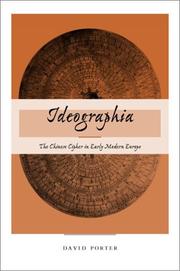| Listing 1 - 10 of 227 | << page >> |
Sort by
|
Book
ISBN: 2130811647 Year: 2022 Publisher: [Place of publication not identified] : Presses Universitaires de France,
Abstract | Keywords | Export | Availability | Bookmark
 Loading...
Loading...Choose an application
- Reference Manager
- EndNote
- RefWorks (Direct export to RefWorks)

ISBN: 0804732035 Year: 2001 Publisher: Stanford (Calif.): Stanford university press
Abstract | Keywords | Export | Availability | Bookmark
 Loading...
Loading...Choose an application
- Reference Manager
- EndNote
- RefWorks (Direct export to RefWorks)
Europe --- Civilization --- Chinese influences
Book
ISBN: 7202025221 Year: 1999 Publisher: 石家庄 河北人民出版社
Abstract | Keywords | Export | Availability | Bookmark
 Loading...
Loading...Choose an application
- Reference Manager
- EndNote
- RefWorks (Direct export to RefWorks)
Book
ISBN: 1438473087 1438473079 1438473060 9781438473086 9781438473079 Year: 2019 Publisher: Albany State University of New York Press
Abstract | Keywords | Export | Availability | Bookmark
 Loading...
Loading...Choose an application
- Reference Manager
- EndNote
- RefWorks (Direct export to RefWorks)
"While current scholarship on Tokugawa Japan (1603-1868) tends to see China as either a model or "the Other," Wai-ming Ng's pioneering and ambitious study offers a new perspective by suggesting that Chinese culture also functioned as a collection of "cultural building blocks" that were selectively introduced and then modified to fit into the Japanese tradition. Chinese terms and forms survived, but the substance and the spirit were made Japanese. This borrowing of Chinese terms and forms to express Japanese ideas and feelings could result in the same things having different meanings in China and Japan, and this process can be observed in the ways in which Tokugawa Japanese reinterpreted Chinese legends, Confucian classics, and historical terms. Ng breaks down the longstanding dichotomies between model and "the other," civilization and barbarism, as well as center and periphery that have been used to define Sino-Japanese cultural exchange. He argues that Japanese culture was by no means merely an extended version of Chinese culture, and Japan's uses and interpretations of Chinese elements were not simply deviations from the original teachings. By replacing a Sinocentric perspective with a cross-cultural one, Ng's study represents a step forward in the study of Tokugawa intellectual history"--
Japan --- China --- Civilization --- Chinese influences.
Book
ISBN: 0691629854 0691610606 Year: 2017 Publisher: Princeton, New Jersey ; Guildford, Surrey : Princeton University Press,
Abstract | Keywords | Export | Availability | Bookmark
 Loading...
Loading...Choose an application
- Reference Manager
- EndNote
- RefWorks (Direct export to RefWorks)
From the beginning of its recorded history until the opening to the West in the last century, Japan was caught between a love for and a rejection of Chinese civilization. David Pollack argues that the dialectical relationship between the two countries figured more importantly in the Japanese sense of identity and signification than any particular borrowed Chinese cultural materials.Originally published in 1986.The Princeton Legacy Library uses the latest print-on-demand technology to again make available previously out-of-print books from the distinguished backlist of Princeton University Press. These editions preserve the original texts of these important books while presenting them in durable paperback and hardcover editions. The goal of the Princeton Legacy Library is to vastly increase access to the rich scholarly heritage found in the thousands of books published by Princeton University Press since its founding in 1905.
Japan --- Civilization --- Chinese influences. --- Civilization.
Book
ISBN: 0890284350 Year: 1985 Publisher: Monticello (Ill.): Vance bibliographies
Abstract | Keywords | Export | Availability | Bookmark
 Loading...
Loading...Choose an application
- Reference Manager
- EndNote
- RefWorks (Direct export to RefWorks)
Book
Abstract | Keywords | Export | Availability | Bookmark
 Loading...
Loading...Choose an application
- Reference Manager
- EndNote
- RefWorks (Direct export to RefWorks)
Book
ISBN: 0856680230 Year: 1975 Publisher: Warminster : Aris and Phillips,
Abstract | Keywords | Export | Availability | Bookmark
 Loading...
Loading...Choose an application
- Reference Manager
- EndNote
- RefWorks (Direct export to RefWorks)
Book
ISBN: 9789869269339 9869269338 Year: 2016 Publisher: Taibei Shi : Lie hai ren,
Abstract | Keywords | Export | Availability | Bookmark
 Loading...
Loading...Choose an application
- Reference Manager
- EndNote
- RefWorks (Direct export to RefWorks)
Australian literature --- Chinese literature --- Chinese influences.
Book
Abstract | Keywords | Export | Availability | Bookmark
 Loading...
Loading...Choose an application
- Reference Manager
- EndNote
- RefWorks (Direct export to RefWorks)
| Listing 1 - 10 of 227 | << page >> |
Sort by
|

 Search
Search Feedback
Feedback About UniCat
About UniCat  Help
Help News
News